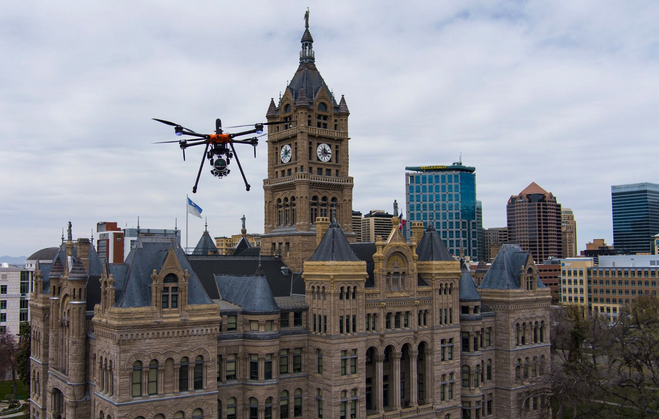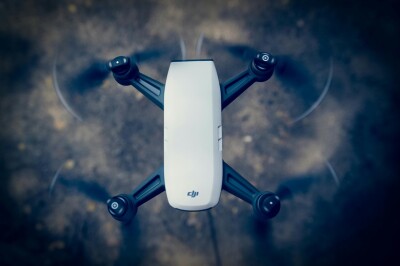The recent Senate vote to ban DJI in the NDAA bill may have come as a shock to some, but for those who have been paying attention, it was no surprise. Companies should have been prepared for this action years ago, given the growing concerns around data security and national security risks associated with DJI drones. At Sundance Media Group and our resale partner, The LiDAR Pros, we have been anticipating this event since 2017 and have taken proactive steps to ensure that we are prepared for any regulatory changes which may come our way.
With the House passing the National Defense Authorization Act (NDAA) on June 14th, which includes the Strategic Competition with the Chinese Communist Party language, those changes could be coming sooner than anticipated.
Understanding the Impetus Behind the DJI Ban
The legislative move to exclude DJI from the NDAA stemmed from escalating anxieties over how these drones might inadvertently serve as conduits for sensitive information leakage. The core concern is based on the apprehension that DJI drones, by virtue of their sophisticated data collection capabilities, could funnel critical data beyond U.S. borders, directly threatening national security.
This isn't a sudden revelation but a culmination of growing unease regarding the expansive deployment of these drones in sensitive sectors. As drones have woven themselves into the fabric of both commercial and governmental operations, the imperative for stringent oversight has become undeniable.
This action, therefore, is not just about a ban but a decisive step towards safeguarding the integrity of sensitive data and, by extension, reinforcing national security in an era where technological advancements are both a boon and a bane. DIU and other agencies, as well as private individuals, have demonstrated data transfer is taking place, and has been for many years.
The Writing Was on the Wall: Predicting the Ban
For those deeply embedded in the fabric of the drone industry, the narrative surrounding DJI's eventual exclusion was not emerging from a vacuum. It unfolded with a sense of predictability.
The heightened scrutiny over DJI's connections and the potential implications for data integrity and national security were prominent signals, pointing towards an inevitable regulatory response. As early as the dialogue began to shift towards these concerns in 2016, it became evident that reliance on DJI's technology without considering alternatives was a precarious strategy. The anticipation of regulatory actions against DJI underscored the importance of foresight and adaptability in the dynamic landscape of drone technology. It was a clear signal for municipalities, counties, state agencies, and companies to evaluate their dependencies and explore diversified, secure solutions in preparation for the evolving regulatory environment.
For us at The LiDAR Pros, it reinforced our commitment to pioneering the development and adoption of compliant and advanced UAS technologies, ensuring readiness and resilience against such foreseeable shifts. That hasn’t been a painless process, which was evident in 2022 when one of the SMG principals was part of a panel at the International Wireless Communications Expo. This comment by Douglas Spotted Eagle...
"So, if you are setting up a drone program and you are a municipality or you are a utility [and choose to use DJI products], … you’re a fool.”
...was utilized by an IWCE publication without context, resulting in significant backlash from the UAS community. The result has generated several nasty emails, including two of the “death threat” variety from DJI fans.
Of critical note, however, is that DJI issued repeated, unequivocal denials regarding data collection which have been proven untrue by multiple sources. These denials have taken place over a lengthy period of time and played a significant role in the erosion of trust.
Supply chain issues, checkerboard state and county issues, informational security issues, price fixing, and unfair marketing tactics all contribute to how DJI has been perceived in the overall industry, and it is in this context we’ve made conscious decisions to move further away from DJI and other Chinese products where possible regardless of whether these are actual issues. We’re not here to fight on behalf of any UAS manufacturer; we’re a business making business decisions.
Sundance Media Group & The LiDAR Pros' Proactive Approach Since 2019
In discerning the evolving dynamics of the drone industry, SMG and her sister organization (The LiDAR Pros) embarked on a strategic pivot away from reliance on DJI technologies, well before the winds of regulatory change swept across the sector. Understanding the implications of potential bans and the critical need for data security, our team initiated a robust campaign to innovate and diversify our UAS offerings. This foresightedness in 2019 was not merely a reaction to emerging threats but a planned move to anchor our operations in the principles of compliance and technological sovereignty.
This pivot entailed a deep dive into research and development, focusing on crafting UAS platforms that not only surpassed the capabilities of what was then available but also aligned with the stringent compliance frameworks anticipated to become industry standards. By fostering partnerships with entities advocating for secure and reliable UAS technologies, we expanded our repertoire to include solutions that adhered to Blue List and NDAA guidelines, ensuring our readiness for the inevitable regulatory shifts.
Our efforts were guided by a clear understanding that the landscape of drone technology was on the brink of a significant transformation. The objective was to ensure that The LiDAR Pros would not merely navigate the changes but lead our clients towards a future where security and innovation coalesce. This approach has fortified our position in the market, offering our clients the assurance that our UAS platforms are not just compliant but emblematic of the future of drone technology.
It was with this in mind that SMG and The LiDAR Pros set out to identify importable solutions from NATO countries such as South Korea, Italy, and other NDAA-friendly partners.
Offering Advanced and Compliant UAS Solutions
 Our pursuit of excellence doesn’t just end with compliance; it's about pushing the boundaries of what's possible in UAS technology. By navigating the intricate landscape of drone regulations, we’ve been able to identify solutions that don’t merely tick the boxes for security and compliance but redefine them.
Our pursuit of excellence doesn’t just end with compliance; it's about pushing the boundaries of what's possible in UAS technology. By navigating the intricate landscape of drone regulations, we’ve been able to identify solutions that don’t merely tick the boxes for security and compliance but redefine them.
Our platforms are the product of rigorous research and innovation, designed to meet the evolving demands of both the industry and our clients. We don't just offer drones; we provide peace of mind, ensuring that every aerial solution from The LiDAR Pros stands at the forefront of technology while firmly adhering to Blue List and NDAA standards.
This dedication to advanced and secure UAS solutions is what makes our offerings not just unique but indispensable to those who prioritize both innovation and integrity in their operations. Through this commitment, we empower our clients to navigate the future of aerial technology with confidence, secure in the knowledge that their operations are both cutting-edge and compliant. While it’s true that we do offer some Chinese-manufactured products, we’re very clear with our clients as to relevant concerns when using these products.
For example, the State of Utah, SB135 oultines a clear pathway to continue to use certain Chinese-manufactured products so long as they can be modified to meet state standards of not broadcasting data at any time. Drone data can be removed from the UAS before being connected to Internet, which is a workflow we can fully support.
The Importance of Staying Ahead in a Changing Landscape
Navigating the terrain of drone technology requires a forward-thinking approach, especially in light of recent legislative changes. This landscape is characterized by swift shifts in regulations, underscoring the essential need for innovation and adaptability.
That's partly why our ethos centers on anticipating future trends and regulatory shifts, ensuring that our solutions not only comply with current standards but are also designed to meet future demands. This proactive stance has allowed us to define benchmarks when it comes to delivering UAS solutions that embody both technological advancement and regulatory foresight.
It’s this commitment to staying at the vanguard of the industry that enables us to equip our clients with the tools necessary for success in an ever-evolving marketplace. By choosing to partner with us, clients are assured of a collaboration that values security, compliance, and innovation. Our partnerships enable stakeholders to confidently face the dynamic future of drone operations regardless of municipal, county, state, or federal regulation.
If passed as written, there is no question the Countering CCP Drones Act will have a significant impact on the US sUAS industry
Regardless of where this piece of legislation lands, the issue will remain a thorny path for any municipal, county, state, or federal agency and those who provide contract services to these teams and depar. We will continue to provide training for DJI owners, and will continue to support the use of any UAS so long as UAS regulations don’t prohibit flight of these airframes. Private operators will likely not be affected, outside of future access issues to these aerial tools.
Passage of the final bill as currently written will undoubtedly impact not only DJI, but thousands of public safety agencies, AEC operations, inspection firms, and other commercial operators of UAS. Now that the House vote has passed, stay tuned for further updates on Senate reconciliation.
Editors note: TLP nor SMG take sides in this debate, rather we have prepared our business model to continue forward movement in the event we may not have access to Da Jaing Innovations products in the future. We own several DJI products, and have used them for years, although we’ve significantly reduced the DJI footprint in our brands since 2017. We have shared our concerns over banning any UAS product at the Covered List level.

















Comments